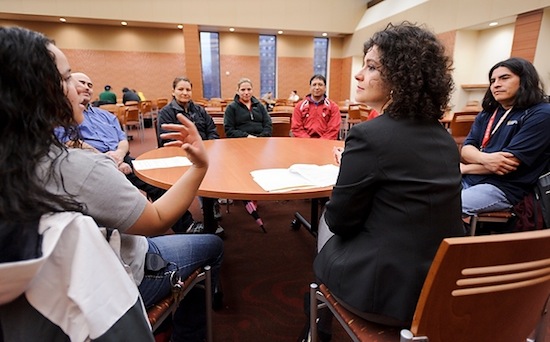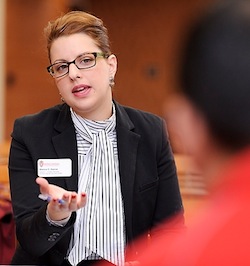CLS interpreters break down language barriers

Spanish-English language interpreter Carmen Romero González, second from right, assists with a University Housing focus-group discussion regarding new-staff orientation processes.
Photo: Jeff Miller
On an early spring morning, about 10 Spanish-speaking UW–Madison employees are having a lively discussion around a table in the Gordon Dining and Event Center.
In the center of the group are Carmen Romero González, training officer supervisor, and Blanca García, training officer with the Office of Human Resource Development’s Cultural Linguistic Services (CLS) unit.
Romero González and García are facilitating a discussion group with new Division of University Housing employees regarding the hiring, socialization and training processes they’ve encountered at UW–Madison. Employees being interviewed by Hmong and Tibetan translators sit a few tables away.
“The facilitated discussions give the employees an opportunity to truly have a voice in the discussion, and they feel more comfortable giving feedback in their native language. They know this feedback will be translated and shared with their department,” Romero González says.
Francisco Luna and Caterine Duque, custodians at Witte Hall who attended the session that morning, say CLS has helped them to learn about job duties and organizational goals, and to understand benefits.
“I think they do a great job in the benefit area helping us understand all the information, and also the facilitation of the discussion groups in our native language helps us to participate and be more included in the organization and work environment,” Duque says.

Blanca García
“This service helps us feel more confident on the job,” Luna adds.
Facilitating discussions like these, which bridge the communications gap between employees who do not speak English as a first language and their supervisors, is just one of the many duties CLS performs on campus. In addition to Spanish, Hmong and Tibetan, CLS provides services in Mandarin Chinese, and will arrange for the contracting of outside interpreters for other languages as the need arises. Services are offered to current employees and job applicants.
CLS interpreters have been a constant presence at campus forums, such as recent information sessions for the HR Design project. Besides translation and interpretation, the unit also provides learning opportunities through the Workplace Learning Program. This program includes English language classes, the Employee Learning Center, the Volunteer Tutoring Program and training sessions. CLS offers services and responds to other needs from departments across the campus.
Romero González is quick to point out there is a difference between interpretation and translation.
“Translators translate from one language to another in written form, i.e. a policy, a flyer, a book. Interpreters verbally interpret information that is communicated in real time at meetings, training, conversations, etc.,” she says. “At CLS, we provide both services, and we are constantly learning and educating ourselves to provide high-quality services.”
Translating or interpreting technical language and jargon can be a challenge, Romero González says.
“Searching for the adequate vocabulary in a specific field and maintaining the register of the language are significant aspects when translating documents into a target language,” she says.
CLS provides both consecutive interpretation, which is recommended for small-group meetings, and simultaneous interpretation using headsets at large-group meetings. When CLS receives an interpretation request from a department, its staff will ask for background or materials that will be presented so they can familiarize themselves with the subject matter.
“Essentially any time you want to communicate with somebody who does not speak English as a first language they help us, and they are very helpful.”
Kris Ackerbauer
“This gives us the opportunity to precisely prepare for the interpretation and become familiar with the topic and terms,” Romero González says.
CLS was modeled after similar services at Harvard University and the University of California, Davis in 2001. The agency has been recognized for its work, winning an award for best practices from the International Public Management Association for Human Resources in 2007 and the 2010 Diversity Program Achievement Award by the State Council on Affirmative Action.
In addition, CLS was chosen as a model program at the National Conference on Race & Ethnicity in American Higher Education for three consecutive years. The University of Iowa has modeled its own program after CLS.
The services the unit offers are an important part of helping UW–Madison attract and retain a diverse workforce, Romero González says. CLS’ mission is to enhance communication, cultural understanding and learning to advance a multilingual work environment.
Kris Ackerbauer, Facilities Planning and Management assistant director, estimates that about one-third of FP&M’s custodial employees are non-native English speakers, though not all require interpreters.
“They help us with benefits sessions, training, they help us with disciplinary issues,” Ackerbauer says. “Essentially any time you want to communicate with somebody who does not speak English as a first language they help us, and they are very helpful.”
“We use their staff to cover daily needs — on-the-spot interpretation, orientation for new staff, evaluation — for staff that really need full English support or need someone here for complicated language,” says Brenda Krueger, human resources manager at University Housing.
“They are very professional in what they do. Their guidance and assistance through many meetings has taught me a lot about how best to work with an interpreter,” Krueger adds.
Rachel Stieve, a payroll supervisor in housing and a member of the department’s onboarding committee, says the department will use the information gathered from facilitated discussions to refine training programs and help new employees acclimate better. She says CLS is essential to getting a full picture of how effective the onboarding process is.
“We work very closely with them,” Stieve says. “They really are good at building relationships with employees. Employees feel confident approaching them.”
For more information on CLS, contact email Carmen Romero González.




